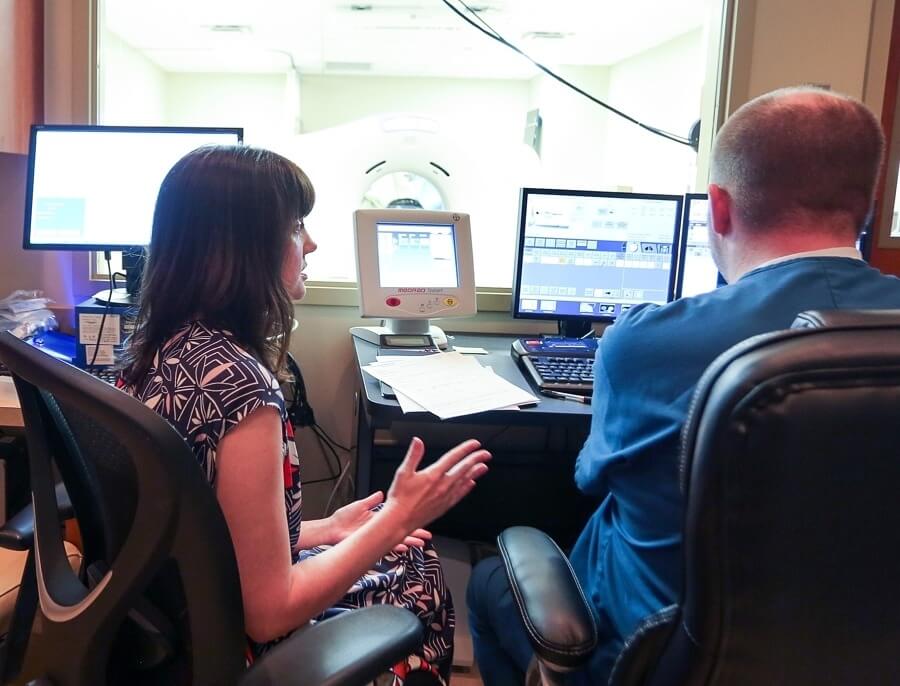Dr. Casey Chollet grew up in Brentwood, TN, graduating from Christ Presbyterian Academy before heading off to college and then medical school. Today, she’s a radiation oncologist with Sarah Cannon Cancer Institute at TriStar Health, treating, educating and making a tremendous impact on the lives of her patients. When she’s not working, she enjoys checking out Nashville’s ever-growing new restaurant scene, but today we’re talking about healthcare. Welcome today’s FACE of TriStar, Dr. Casey Chollet!

Dr. Casey Chollet, doctor of radiation oncology with Sarah Cannon Cancer Institute at TriStar Health, associate with Tennessee Oncology, PLLC, and today’s FACE of TriStar
Did you always know that you wanted to be a physician?
I decided I wanted to be a doctor when I was 8 years old and my sister was born premature. My family spent seven weeks in the NICU, and I knew that I wanted to be one of the people that helped my mother and sister.
Why did you decide to specialize in oncology, and how long have you been practicing?
I did research and volunteer work at St. Jude while in medical school. From the moment I walked in the door, I knew I wanted to be an oncologist. It’s an amazing organization, and I had a great mentor in the chair of radiation oncology.
How long have you been at TriStar, and what is the best part about working there?
I have been with Sarah Cannon Cancer Institute at TriStar Health for three years. I love working at TriStar because of their readiness to listen to physicians and involve us in clinical leadership so that we can create the best environment for our patients.
What has been the most rewarding case you have ever treated, and why was it so rewarding?
The most rewarding case I’ve ever treated was a breast cancer patient with metastatic disease. Her primary goal was to feel well enough to be able to travel to visit her new grandchild in another state. We worked really hard to formulate a care plan that balanced disease control and limited side effects. She got to go on the trip and sent me back pictures where she had the biggest smile. Nothing better than that!

Dr. Chollet is pictured in her office at Sarah Cannon Cancer Institute at TriStar StoneCrest Medical Center.
How is cancer treatment different today than it was when you first began your career?
Everything is becoming more targeted … both with chemotherapy and radiation therapy. As an example, for left-sided breast cancers, we can use different techniques to completely avoid radiation dose to the heart — hopefully sparing patients a lot of the side effects seen in the past.
What is the single-most important thing a woman can do for her own health and why?
Remember to take care of herself! I see so many women who delay their own care — mammograms, colonoscopies, etc. — because they were too busy caring for a spouse, or taking the kids to after-school events, worrying about family expenses etc., that they don’t make time to keep their own appointments or go in when they notice something changing.
What is the biggest misconception people have about breast cancer, and how do you mitigate that misconception when you hear it?
The biggest misconception I see is when patients think they did something to deserve it or cause it. Sometimes half my consult time can be spent trying to get the patient to accept she did nothing wrong.
Where do you envision breast cancer treatment and outcomes in 10 years? And how about 20 years?
Earlier and earlier diagnosis, which will hopefully lead to more localized and targeted therapies.
Who has been a role model or mentor for your professional life and why?
Historically there have not been a lot of women in my field. Thankfully that is changing. But I have several strong women colleagues from my time at Duke who helped me learn how to balance being an oncologist and a wife and mother. Some days it is easier to do that than others.
What is the number one health trend you’re seeing, and is it good or bad? Why?
I’m worried about the trend of double mastectomies in breast cancer, the “Angelina Jolie Effect,” as we call it. It is absolutely the right thing to do for some women, but I fear we are being overly aggressive in pursuing a deforming surgery that hasn’t been shown to be beneficial for most breast cancer patients.

Dr. Chollet clearly makes an impact on the lives of her patients … how rewarding!
What are three things you want all newly diagnosed breast cancer patients to keep in mind?
Every breast cancer is different. Every patient is unique. And you should work with your doctors to find the right plan for you. If you have concerns about your care plan, seek a second opinion — it won’t hurt our feelings!
Sarah Cannon Cancer Institute at TriStar StoneCrest is part of Sarah Cannon, the global cancer institute of Hospital Corporation of America (HCA). Together, Sarah Cannon offers integrated cancer services with convenient access to cutting-edge therapies for those facing cancer in communities across the United States and United Kingdom. Learn more at sarahcannon.com.
FACES of TriStar is sponsored by TriStar Health. Photography by Grannis Photography.






















